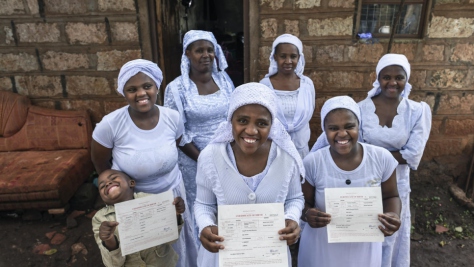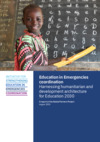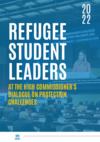Men, women and children suffering from harsh physical conditions and legal shortcomings at Pacific Island asylum centres: UNHCR reports
This is a summary of what was said by UNHCR spokesperson Adrian Edwards – to whom quoted text may be attributed – at today's press briefing at the Palais des Nations in Geneva.
In two reports released today, UNHCR finds that asylum-seekers transferred from Australia to processing centres at Nauru and Manus Island in Papua New Guinea (PNG) are living in arbitrary detention in conditions that do not meet international standards of treatment.
UNHCR understands Australia's determination to respond robustly to the challenges of people smuggling and to dissuade people from undertaking dangerous irregular travel by sea. However we believe those responses must not neglect the compelling protection needs, safety and dignity of the individuals affected.
These reports are also in the context of what UNHCR has observed to be a sharp deterioration during 2013 in the overall quality of protection and support available to asylum-seekers and refugees who come to Australia by boat. It remains the case that when policies and practices are based primarily on deterrence, they can have harmful and, at times, punishing consequences for people affected, particularly families and children.
The reports identify troubling shortcomings at both centres, and urge all three States involved to consider the findings and recommendations and act upon them.
In both Nauru and PNG the current policies, operational approaches and harsh physical conditions at the centres not only do not meet international standards - they also have a profound impact on the men, women and children housed there.
UNHCR is concerned that they constitute mandatory detention which is not compatible with international law. We are also worried that they do not provide a fair and efficient system for assessing refugee claims, do not provide safe and humane conditions of treatment in detention, and do not provide for adequate and timely solutions for recognized refugees.
With the Nauru report, it acknowledges some positive developments since our last visit in March. However, there have also been significant setbacks in refugee processing, and a deterioration in reception conditions. Despite a processing system being in place under Nauru law, only one decision has been handed down in the 14 months since the centre reopened.
No decisions at all have been finalized at the centre in PNG, and while some improvements were observed since UNHCR's last inspection in June, the physical conditions within detention, together with the slowness of processing and the lack of clarity regarding safe and sustainable solutions for refugees were likely, together, to have a serious and negative effect on the health and welfare of people transferred from Australia.
At both centres, the psycho-social well-being of vulnerable people - including survivors of torture and trauma and unaccompanied children - is an issue of concern. UNHCR also called on all three States not to transfer children, particularly those who are unaccompanied, unless and until there has been a marked improvement in conditions in both centres.
UNHCR is particularly concerned by the impact of policies that will prevent recognized refugees from finding safe, dignified and sustainable solutions in the medium to long term. The prospect for refugees in PNG finding permanent protection there presents formidable challenges, and it is clear that Nauru will offer only very limited opportunities for refugees even in the shorter term.
UNHCR believes the arrangements at Nauru and PNG would benefit from a much clearer articulation of the policy and operational framework that would set out how, when and where refugees will be able to secure protection and exercise the rights required under the 1951 Refugee Convention.
The full reports, including recommendations, are available at: www.unhcr.org.au
For more information on this topic, please contact:
- In Canberra (Regional): Ben Farrell on mobile +61 407 971 686
- In Geneva: Adrian Edwards on mobile +41 79 557 91 20
- Babar Baloch on mobile +41 79 557 9106
Related news and stories
Global photo project shows power of football during displacement
The Kenyan powerhouse improving women's lives in Australia
UN refugee chief welcomes cities' support for refugees
UNHCR appeals to Australia to act and save lives at immediate risk
UNHCR urges Australia to end separation of refugee families
'We must believe we can make a difference and we can do things better' - Andrew Harper
-

'I want all Shona women to see that they can be anything they want'
11 Nov 2020 Over 18,000 stateless people in Kenya struggle to access basic services as they lack official identity documents. A young woman has made history as the first stateless Shona woman to make it to university. -

UNHCR urges states to end limbo for stateless people by 2024
11 Nov 2020 UNHCR's #IBelong Campaign, to end statelessness by 2024, Filippo Grandi calls for protection of stateless populations as COVID-19 is worsening the plight of millions of stateless people worldwide. -

Education in Emergencies coordination - Harnessing humanitarian and development architecture for Education 2030 (PDF)
10 Nov 2020 This report presents learning and recommendations from UNHCR, the Global Education Cluster and INEE on strengthening education in emergencies (EiE) coordination -

UNHCR expands aid as Ivorian refugee numbers top 8,000
10 Nov 2020 UNHCR expands aid to Ivorian refugees amid political tensions in Côte d'Ivoire. -

UNICEF - Final Session High Commissioner Dialogue
9 Nov 2020 -

Tertiary Education Student Network Report - 2020
6 Nov 2020 In this report, the Tertiary Refugee Student Network (TRSN) informs about its founding process and mission and its activities around the world. The student-led Tertiary Refugee Student Network, founded in 2019, connects refugee students worldwide and elevates refugee student activism to the global level. With members in over 15 countries and activities on local, national and global level, the TRSN advocates for increasing the percentage of refugee youth enrolled in higher education to 15% by 2030. -

Refugee Student Leaders: High Commissioner's Dialogue on Protection Challenges 2022
6 Nov 2020 This is a report about refugee youth leaders who spoke at the High High Commissioner's Dialogue on Protection Challenges 2022. -

Cash aid brings relief to Libyan families uprooted by clashes
5 Nov 2020 After fighting in Tripoli twice drove Hanan and her children from their homes, they finally found refuge in an unfinished building before receiving financial help from UNHCR. -

Initiative for Child Rights in the Global Compacts - Statement at the High Commissioner Dialogue
4 Nov 2020 Session on protection considerations
